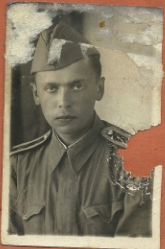Vladimir Altshuler was born in 1924 in Vitebsk, the only child of two low-ranking administrative clerks. In the late 1920s, his family moved to Leningrad (present-day St. Petersburg, Russia). While at school, Vladimir intended to be a musician and played the second violin in the Symphonic Orchestra of the Leningrad Pioneers Palace.
Following the outbreak of the Soviet-German war, the 17-year-old Vladimir was drafted into various units carrying out police functions in the city, and served in the air raid defense forces. With anxiety, he watched a surge of antisemitism in Leningrad in summer-autumn 1941. Thus, an entry in his diary in late July 1941 reads: "It [antisemitism] has greatly increased. They are probably looking forward to Hitler'sarrival, so that they can abuse and kill Jews together [with the Germans]. They won't succeed. Why the Jews are so disliked, I cannot understand. They are probably the most miserable people in the world". A month later, he added: "The Russians are eagerly looking forward to [the enemy]. If we don't die by his hand, we will surely die at their hands". In October 1941, despite having been diagnosed with cardiomegaly, Vladimir was called up for pre-conscription military training. In winter 1941-42, with most of his relatives already evacuated from Leningrad, Vladimir and his parents also managed to leave the city. His father Iakov died in the evacuation train from typhus (or typhoid fever).
Vladimir Altshuler was called up for active service by the Sukhumi enlistment office in September 1942, and was sent to an artillery school. Upon graduating from it in February 1944, Second Lieutenant Altshuler was attached to the 659th Artillery Regiment of the 221st Mariupol Rifle Division as the commander of a platoon. With this regiment, he fought first in Ukraine, west of Kiev (until April 1944), then at the Leningrad Front (April-July 1944), and afterward in Lithuania and East Prussia (where he was wounded). For a valiant counter-attack carried out by his platoon in an area east of Königsberg in February 1944, Lieutenant Altshuler was awarded the Order of the Patriotic War, 2nd class; this was later followed by the medal "For the Capture of Königsberg". In May-June 1945, the 221st Mariupol division was transferred to Mongolia, and then to Chinese Manchuria, where Altshuler took part in the crossing of the Greater Khingan range and the war against Japan (for this, he was awarded the Order of the Red Star). There, he witnessed "V-J Day" in September 1945. After the end of the war, Altshuler continued his military service in Transbaikalia. In 1956, he was demobilized as senior lieutenant and returned to Leningrad He worked in the administration of the Leningrad branch of "Akademkniga" (a chain of bookstores selling scientific literature). He retired in 1982 as the director of the Leningrad branch of "Akademkniga".
Vladimir Altshuler died of cancer in 1983.







